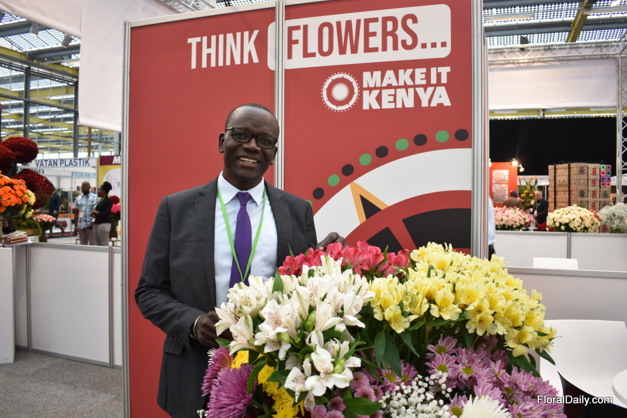As the industry is getting into one of the busiest periods of the year, logistics-related challenges don’t seem to ease. In fact, with the huge demand expected from Valentine’s Day, and Woman's Day, to Mother’s Day, such challenges are even more pressing. “The demand is high,” says Clement Tulezi, CEO of the Kenyan Flower Council (KFC). “Yet, there is a global rose shortage. There have been shortages in the past, but recently these have mainly to do with COVID.”

Clement Tulezi at the IFTF, back in 2019, the Netherlands
“In all the markets, people are looking for roses,” he continues. “This would be an ideal situation for us, since Kenya is a rose-producing country primarily. When there is a shortage, we can be sure that we can move our product, and we can also rely on good prices. Yet, logistics is a huge global problem now, as well as the increased fertilizer prices. All of that put a huge strain on the potential revenue of the industry as a whole.”
Rising transportation and operational costs
This means that while rose prices are high, and people are even willing to pay for that, most of that money would be used to offset the cost of the fertilizer and the cost of the freight.
“As of now, the average price per kilo to move Kenyan flowers is $5.7, which is three times higher than it used to be. Then, you have the increased operational cost on the other end; considering how everything has become so expensive, the industry would hardly be able to sell for a net profit.”
Although those are all global challenges, Tulezi and the KFC have engaged the government and suggested possible local solutions to support the Kenyan flower industry. “There are a few things that could be adjusted here so the industry could greatly benefit from,” he remarks. “As of now, every flight to Nairobi has to go to their base airport before going to the market location. This adds up to the cost. We believe that if the government can issue permits for the direct movements of foreign passenger aircrafts from Nairobi to the market destination, then it will ease the cost burden and keep our competitiveness. On top of that, we have asked our government to allow more foreign passenger flights, only temporarily though. This would be good throughout this period, from Valentine’s to Mother’s Day.”
Local solutions
Tulezi continues to explain that KFC has been trying to convince the government to see the bigger picture, which is not necessarily about Kenyan flowers only. “First of all, it’s not about flowers. Floriculture is the second biggest export sub-sector in Kenya, and it doesn’t exist in a vacuum. There are a lot of jobs, and other sectors too, that are deeply intertwined with floriculture. This means that there are other jobs and sectors at stake; and supporting our industry would have positive ripple effects.”
Consequences would happen not only in Kenya but elsewhere too. “There are only a handful of countries other than us that produce the kind of flowers we grow,” Tulezi points out. “If we can’t deliver, it means that the market would be left with a huge gap. Only a few places have the growing conditions to produce roses and other outdoor flowers and ornamentals, and it is not that they can make more than what they do. As the Kenyan flower industry, we support the global flower business: imagine the ramification that our sudden decline could have on the global flower trade. We have to live day by day, and hope that solutions are quickly found.”
For more information: Kenya Flower Council
Kenya Flower Council
Suite 12, 4th Floor,
The Greenhouse Building,
Adams Arcade, along Ngong Road
Mobiel: +254 (0)733 639 523
[email protected]
kenyaflowercouncil.org










